| Listing 1 - 10 of 25 | << page >> |
Sort by
|
Periodical
ISSN: 19933800 19933819 Year: 2007 Publisher: Paris Institut Veolia
Abstract | Keywords | Export | Availability | Bookmark
 Loading...
Loading...Choose an application
- Reference Manager
- EndNote
- RefWorks (Direct export to RefWorks)
S.A.P.I.EN.S is a peer-reviewed, open access, multidisciplinary journal focused on sustainability. We publish critical analyses and evidence-based opinions.
Human ecology --- Ecologie humaine --- Periodicals --- Périodiques --- Human ecology. --- Social Sciences --- Anthropology --- sustainability --- Ecology --- Environment, Human --- Human beings --- Human environment --- Social aspects --- Ecological engineering --- Human geography --- Nature --- Effect of environment on --- Effect of human beings on --- Anthropogeography & Human Ecology

ISBN: 1554882400 9786611967925 9781459718395 1281967920 9781554882403 1459718399 1897045212 9781897045213 9781897045213 1897045212 6611967923 9781281967923 Year: 2007 Publisher: Toronto Natural Heritage Books
Abstract | Keywords | Export | Availability | Bookmark
 Loading...
Loading...Choose an application
- Reference Manager
- EndNote
- RefWorks (Direct export to RefWorks)
Friluftsliv is an approach to creating a relationship between humans and nature. Nature First explores ways of applying this wisdom to everyday out-of-doors life.
Outdoor life. --- Human ecology. --- Ecology --- Environment, Human --- Human beings --- Human environment --- Ecological engineering --- Human geography --- Nature --- Rural life --- Manners and customs --- Camping --- Sports --- Social aspects --- Effect of environment on --- Effect of human beings on
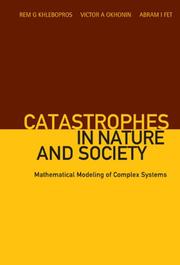
ISBN: 1281120979 9786611120979 9812707557 9789812707550 9812569170 9789812569172 9781281120977 6611120971 Year: 2007 Publisher: Hackensack, NJ World Scientific
Abstract | Keywords | Export | Availability | Bookmark
 Loading...
Loading...Choose an application
- Reference Manager
- EndNote
- RefWorks (Direct export to RefWorks)
Many people are concerned about crises leading to disasters in nature, in social and economic life. The book offers a popular account of the causative mechanisms of critical states and breakdown in a broad range of natural and cultural systems - which obey the same laws - and thus makes the reader aware of the origin of catastrophic events and the ways to avoid and mitigate their negative consequences. The authors apply a single mathematical approach to investigate the revolt of cancer cells that destroy living organisms and population outbreaks that upset natural ecosystems, the balance between
Human ecology --- Natural disasters --- Natural calamities --- Disasters --- Ecology --- Environment, Human --- Human beings --- Human environment --- Ecological engineering --- Human geography --- Nature --- Mathematical models. --- Social aspects --- Effect of environment on --- Effect of human beings on
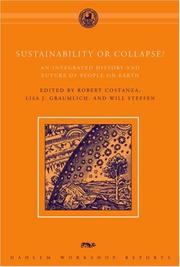
ISBN: 1282096982 9786612096983 0262270862 1429421045 0262293765 9780262270861 9781429421041 0262033666 9780262033664 6612096985 9780262293761 9781282096981 Year: 2007 Publisher: Cambridge, Mass. The MIT Press
Abstract | Keywords | Export | Availability | Bookmark
 Loading...
Loading...Choose an application
- Reference Manager
- EndNote
- RefWorks (Direct export to RefWorks)
Scholars from a range of disciplines develop an integrated human and environmental history over millennial, centennial, and decadal time scales and make projections for the future.Human history, as written traditionally, leaves out the important ecological and climate context of historical events. But the capability to integrate the history of human beings with the natural history of the Earth now exists, and we are finding that human-environmental systems are intimately linked in ways we are only beginning to appreciate. In Sustainability or Collapse?, researchers from a range of scholarly disciplines develop an integrated human and environmental history over millennial, centennial, and decadal time scales and make projections for the future. The contributors focus on the human-environment interactions that have shaped historical forces since ancient times and discuss such key methodological issues as data quality. Topics highlighted include the political ecology of the Mayans; the effect of climate on the Roman Empire; the "revolutionary weather" of El Nino from 1788 to 1795; twentieth-century social, economic, and political forces in environmental change; scenarios for the future; and the accuracy of such past forecasts as The Limits to Growth.
Human ecology --- History --- Ecology --- Environment, Human --- Human beings --- Human environment --- Social aspects --- Ecological engineering --- Human geography --- Nature --- Effect of environment on --- Effect of human beings on --- ENVIRONMENT/General --- HUMANITIES/History --- Human ecology. Social biology --- Environmental protection. Environmental technology --- #SBIB:316.334.5U34 --- #SBIB:93H3 --- Sociologie van stad en platteland: milieuproblematiek --- Thematische geschiedenis
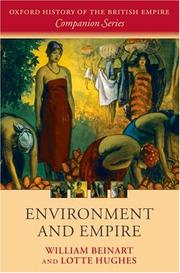
ISBN: 0191917540 1281164194 9786611164195 0191566284 1435617665 9780191566288 9781281164193 0199260311 9780199260317 6611164197 9781435617667 9780191917547 Year: 2007 Publisher: Oxford New York Oxford University Press
Abstract | Keywords | Export | Availability | Bookmark
 Loading...
Loading...Choose an application
- Reference Manager
- EndNote
- RefWorks (Direct export to RefWorks)
Environment and Empire uncovers the fascinating interaction between people and the elements in very different British colonies throughout the world. Providing a rich overview of socio-environmental change, driven by imperial forces, this fascinating new study examines a key global historical process of the last 500 years. British imperial authorities were concerned about overexploitation and the potential risks to nature and material production, and this bookexamines the rise of conservation as a result. It also looks at political reassertions by colonised peoples over natural resources, who in a post-imperial age have found a new voice, expressing ideas about landscape and heritage, and challenging views of who 'owns', and may regulate, nature.
Human ecology --- Natural resources --- Plant ecology --- Botany --- Phytoecology --- Plants --- Vegetation ecology --- Ecology --- National resources --- Resources, Natural --- Resource-based communities --- Resource curse --- Environment, Human --- Human beings --- Human environment --- Ecological engineering --- Human geography --- Nature --- Economic aspects --- Social aspects --- Effect of environment on --- Effect of human beings on --- Great Britain --- Colonies --- Environmental conditions. --- Floristic ecology
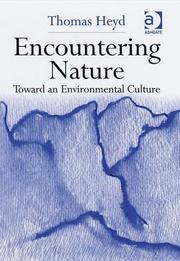
ISBN: 1317143973 1281208493 9786611208493 0754687112 9780754687115 0754654230 9780754654230 9781317143970 9781281208491 6611208496 9781315579450 9781317143963 9781138275928 1317143981 1315579456 Year: 2007 Publisher: Aldershot, England Burlington, VT Ashgate
Abstract | Keywords | Export | Availability | Bookmark
 Loading...
Loading...Choose an application
- Reference Manager
- EndNote
- RefWorks (Direct export to RefWorks)
This book argues that an attentive encounter with nature is of key importance for the development of an environmentally appropriate culture. The fundamental idea is that the environmental degradation that we are increasingly experiencing is best conceived as the consequence of a cultural mismatch: our cultures seem not to be appropriate to the natural environment in which we move and on which we depend in thoroughgoing ways. In addressing this problem, Thomas Heyd weaves together a rich tapestry of perspectives on human interactions with the natural world, ranging from traditional modes of man
Human ecology. --- Environmental ethics. --- Environmental quality --- Human ecology --- Ethics --- Ecology --- Environment, Human --- Human beings --- Human environment --- Ecological engineering --- Human geography --- Nature --- Moral and ethical aspects --- Social aspects --- Effect of environment on --- Effect of human beings on --- Ecologie humaine --- Ethique de l'environnement --- Philosophy --- Philosophie
Book
ISBN: 1921313307 1921313315 9781921313318 9781921313301 Year: 2007 Publisher: Canberra ANU Press
Abstract | Keywords | Export | Availability | Bookmark
 Loading...
Loading...Choose an application
- Reference Manager
- EndNote
- RefWorks (Direct export to RefWorks)
Northern Australia stands out as one of the largest natural areas remaining on Earth- alongside such global treasures as the Amazon rainforests, the boreal conifer forests of Alaska and Canada, and the polar wilderness of Antarctica. Nature remains in abundance in ‘the North.’ Its intact tropical savannas, rainforests, and free flowing rivers provide a basis for much of the economic activity and the quality of life for residents of the area. The Nature of Northern Australia details the latest science on the Northern environment. With increasing debate over the future of Australia’s often forgotten North, this is a timely examination of its environmental significance, the ecological processes that make it function, and the economies that are compatible with maintaining healthy communities and people and healthy country into the future. The authors, Dr. John Woinarski, Professor Brendan Mackey, Professor Henry Nix and Dr. Barry Traill, are leading experts on the environment of Northern Australia, and combined have many decades of experience on Northern ecology and land management.
Environmental sciences --- Human ecology --- Social ecology --- Human geography --- Anthropo-geography --- Anthropogeography --- Geographical distribution of humans --- Social geography --- Anthropology --- Geography --- Human ecology --- Ecology, Social --- Environment, Human --- Human ecology (Social sciences) --- Human environment --- Social sciences --- Ecology --- Environment, Human --- Human beings --- Human environment --- Ecology --- Ecological engineering --- Human beings --- Human geography --- Nature --- Environmental science --- Science --- Social aspects --- Ecology --- Effect of environment on --- Effect of human beings on --- Australia, Northern --- Australia, North (Region) --- Australia, Tropical --- North Australia (Region) --- Northern Australia --- Top End (Australia) --- Tropical Australia --- Economic conditions.
Book
ISBN: 8175965218 8175965215 8175968354 9786610924837 1280924837 1552503682 Year: 2007 Publisher: Ottawa : Delhi : International Development Research Centre ; Foundation Books/Cambridge University Press,
Abstract | Keywords | Export | Availability | Bookmark
 Loading...
Loading...Choose an application
- Reference Manager
- EndNote
- RefWorks (Direct export to RefWorks)
Over the past half century, the idea of sustainable development has evolved and rooted itself in the lexicon on international development. But what is it, really? Are development agencies truly committed to long-term sustainable solutions to development issues? Are we learning from our past successes and failures? This book takes an historical perspective on these questions. The analysis begins with the Atlantic Charter, the creation of the United Nations, its family of agencies, and the international development banks. It reviews recommendations from international commissions and conferences, from World bank and UNDP development reports. It comments on governmental policies, human and industrial actions detrimental to the planet's environment and natural resources. It studies the patterns by which biotechnologies essential to human survival and health have progressed over the past 8,000 years, and the consequences of uncontrolled urban growth on food and health security.
Climatic changes -- Environmental aspects. --- Environmental policy -- Cost effectiveness. --- Human ecology. --- Sustainable development. --- Sustainable development --- Economic History --- Business & Economics --- Economic development --- Environmental aspects. --- Ecology --- Environment, Human --- Human beings --- Human environment --- Development, Sustainable --- Ecologically sustainable development --- Economic development, Sustainable --- Economic sustainability --- ESD (Ecologically sustainable development) --- Smart growth --- Sustainable economic development --- Social aspects --- Environmental aspects --- Eco-development --- Ecodevelopment --- Ecological engineering --- Human geography --- Nature --- Effect of environment on --- Effect of human beings on
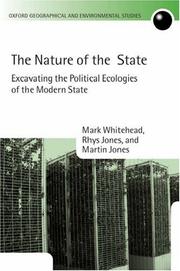
ISBN: 0191917605 128116447X 9786611164478 0191515132 1429470755 9780191515132 9781281164476 6611164472 9781429470759 0199271895 9780199271894 9780191917608 Year: 2007 Publisher: Oxford New York Oxford University Press
Abstract | Keywords | Export | Availability | Bookmark
 Loading...
Loading...Choose an application
- Reference Manager
- EndNote
- RefWorks (Direct export to RefWorks)
'The Nature of the State' challenges the ways in which social scientists and geographers approach the study of state-nature relations. Introducing original research into the different institutional and temporal strategies used by states to frame the natural world, this book provides an overview of political and ecological theories.
Human geography --- Human ecology --- Political geography. --- Political ecology. --- Environmental policy --- Ecology --- Environment, Human --- Human beings --- Human environment --- Ecological engineering --- Nature --- Anthropo-geography --- Anthropogeography --- Geographical distribution of humans --- Social geography --- Anthropology --- Geography --- Environment and state --- Environmental control --- Environmental management --- Environmental protection --- Environmental quality --- State and environment --- Environmental auditing --- Social ecology --- Green movement --- Geography, Political --- Political aspects. --- Social aspects --- Effect of environment on --- Effect of human beings on --- Government policy --- Géographie humaine --- Ecologie humaine --- Géographie politique --- Ecologie politique --- Environnement --- Politique gouvernementale
Book
ISBN: 1282017748 9786612017742 8132101375 9788132101376 Year: 2007 Publisher: Los Angeles [Calif.] SAGE Publications
Abstract | Keywords | Export | Availability | Bookmark
 Loading...
Loading...Choose an application
- Reference Manager
- EndNote
- RefWorks (Direct export to RefWorks)
This volume presents some of the latest developments in research in interdisciplinary. traditions of ecological economics in India. It outlines strategies and policies. that can be adopted to ensure ecological sustainability. Containing both methodological and empirical essays, the book covers a number. of critical issues including:. - Ecological and social resilience. - Ecosystem services and quality of life. - Policy reform for sustainable development. - Governance and ecosystems. - Valuing changes in the ecosystem. - Communities and collective action.
Human ecology --- Social ecology --- Well-being --- Quality of life --- Life, Quality of --- Economic history --- Life --- Social history --- Basic needs --- Human comfort --- Social accounting --- Work-life balance --- Welfare (Personal well-being) --- Wellbeing --- Happiness --- Health --- Wealth --- Ecology, Social --- Environment, Human --- Human ecology (Social sciences) --- Human environment --- Social sciences --- Ecology --- Human beings --- Ecological engineering --- Human geography --- Nature --- Economic aspects --- Social aspects --- Effect of environment on --- Effect of human beings on --- India --- Social conditions. --- Economic conditions.
| Listing 1 - 10 of 25 | << page >> |
Sort by
|

 Search
Search Feedback
Feedback About UniCat
About UniCat  Help
Help News
News